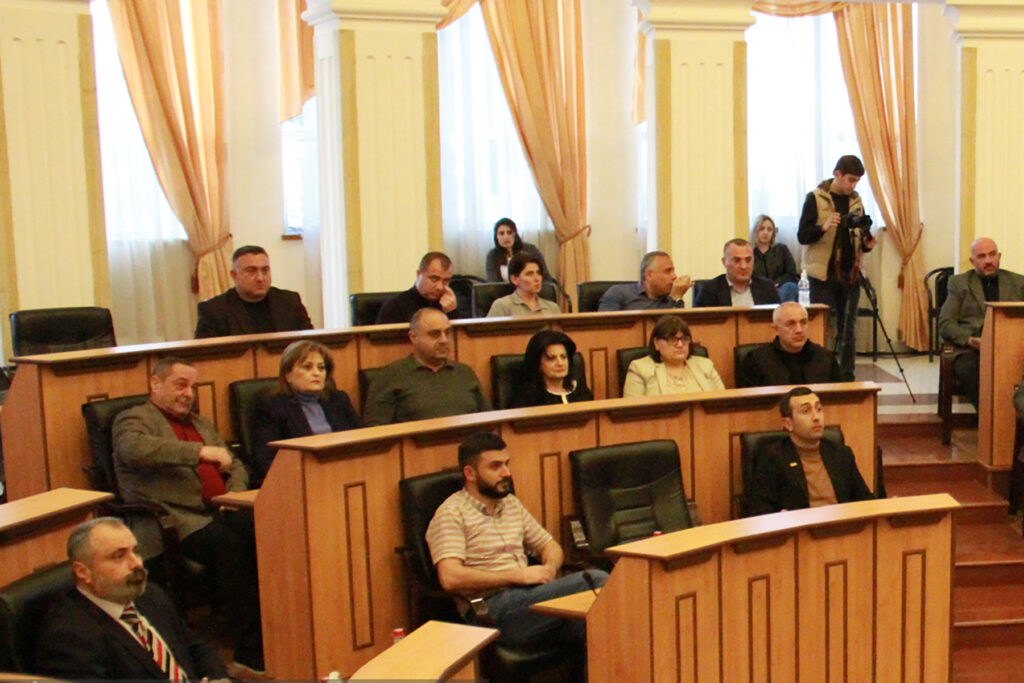Local authorities in Nagorno-Karabakh reacted with outrage after Armenian Prime Minister Nikol Pashiynan spoke about the need to heed international pressure to ‘lower the bar’ on demands for the status of Nagorno-Karabakh, apparently referring to demands for recognition of the region’s independence.
‘No government has a right to lower the negotiating bar for a status acceptable to Artsakh [Nagorno-Karabakh] and the internationally recognized right to self-determination under the pretext of peace’, reads a resolution adopted by the Nagorno-Karabakh Parliament during an extraordinary session held on Thursday.
The resolution also demands that Armenia’s authorities ‘abandon their current disastrous position’.
In his Wednesday address in Parliament, Pashinyan said that the Nagorno-Karabakh conflict is a matter of the ‘rights’ of the ethnic-Armenian population of the region, suggesting that Armenia’s position in demanding the independence of Nagorno-Karabakh was not supported abroad, even by countries friendly to Armenia.
By hewing to the line of international opinion, the Armenian Prime Minister said, they could ‘ensure great international consolidation around Armenia and Artsakh [Nagorno-Karabakh]’.
‘Otherwise’, he said, ‘Armenia cannot rely on international partners, not ‘because [they] do not want to help [us], but because [they] cannot help [us]’.
[Read more: Pashinyan: 'By handing over territories I might have saved thousands of lives']
On 14 April, facing a torrent of criticism from both Armenia and Nagorno-Karabakh, Pashinyan defended his earlier statements.
‘What I’ve been saying is all about not surrendering Karabakh’, he told parliament. If we follow a different path [than the one previously outlined] we will surrender Karabakh.’ The Prime Minister cited Azerbaijan’s recent incursion across the line of contact in Nagorno-Karabakh and the seizure of the village of Parukh (Farukh) as proof of the futility of intransigence. He also stressed that Armenia remains steadfast in its defence of the rights of Armenians living in Nagorno-Karabakh.
President of Nagorno-Karabakh Arayik Harutyuan has been no less committed in public statements in his opposition to dropping the demand for international recognition of Nagorno-Karabakh’s independence. In a meeting with officials and civil society organisations, Harutyunyan repeated that the Armenians of Nagorno-Karabakh won’t give up on their ‘right to self-determination’.
‘We understand that we should live in the [wider geographic] neighbourhood, but subordination [to Azerbaijan] is impossible, it is simply unacceptable’, he said, adding that in his view, the Russian peacekeepers currently stationed in Nagorno-Karabakh, should remain ‘indefinitely’.
Nagorno-Karabakh Foreign Minister Davit Babayan told Azatutyun that Pashinyan’s statements caused a ‘wave of discontent’ in Nagorno-Karabakh.
‘We have no “bar” anymore, we have only red lines drawn by blood’, Babayan said. The essence of the red line, according to Babayan, is that Nagorno-Karabakh ‘will never be part of Azerbaijan’.
Addressing parliament on Friday, Eduard Aghajanyan an MP from Armenia’s ruling Civil Contract party and a close ally of Pashinyan, said that there could be no peace process ‘behind the backs’ of Armenians in Nagorno-Karabakh.
‘The agenda of peace is entirely aimed at the protection and the implementation of the rights of Nagorno-Karabakh Armenians’, he said.
A little later that same day, Vigen Khachatryan, another MP from Civil Contract, said that the long-held ‘idea’ that Nagorno-Karabakh could have no future under Azerbaijani control was ‘wrong’.
Armenian and Azerbaijani leaders have agreed to work together towards a comprehensive peace agreement and the demarcation of the borders.
[Read more: Pashinyan and Aliyev agree to establish border commission by April]
For ease of reading, we choose not to use qualifiers such as ‘de facto’, ‘unrecognised’, or ‘partially recognised’ when discussing institutions or political positions within Abkhazia, Nagorno-Karabakh, and South Ossetia. This does not imply a position on their status.




 15 April 2022
15 April 2022



